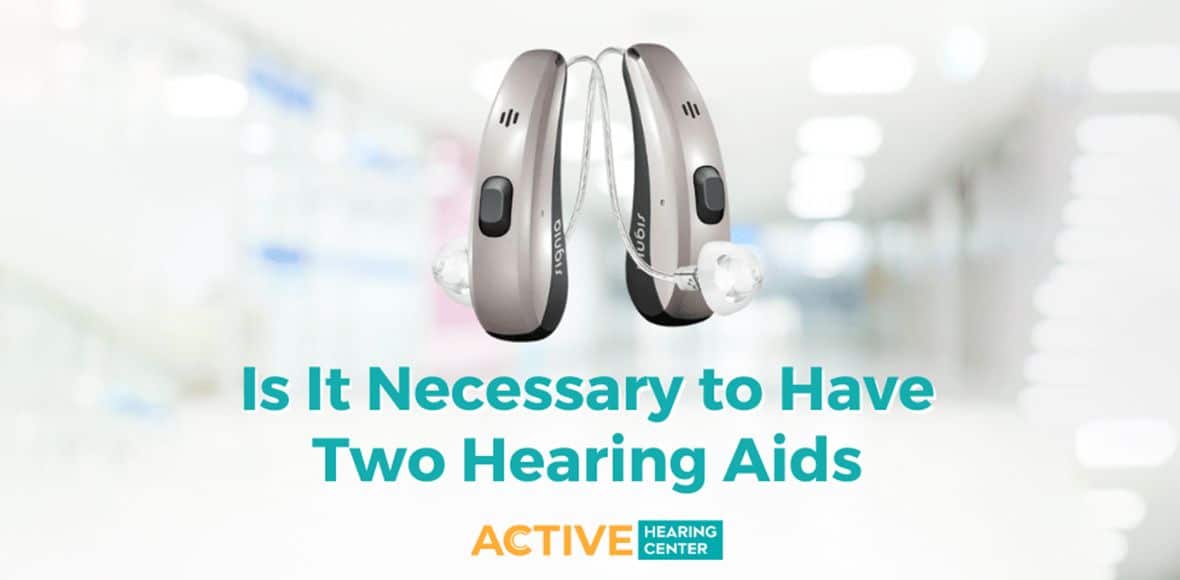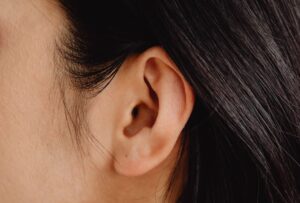Some people would claim that buying one hearing aid is wise because it would be half the cost. Those people don’t acknowledge the importance of audiology tests and the many advantages of purchasing two hearing aids instead of just one.
There is always the idea of getting the cheap one to save money. But without understanding the underlying concerns in the future, will it help you save money or double the cost?
When Should You Purchase Two Hearing Aids?
One of the obvious benefits of wearing two hearing aids is when both ears have a hearing loss. Two hearing aids will boost the general loudness on both ears.
Having two hearing aids can supply more benefits than most people don’t realize. Here are some benefits of having two hearing aids:
Helps in Background Noise
The brain is designed to use sounds from both ears to understand our surroundings fully. It can decipher what information is pertinent to understanding by employing the speech and the noise coming in through both ears and corresponding them against each other. It can concentrate on that sound origin while ignoring the background noise or exchanges competing for our concentration.
When using one hearing aid, we are not benefiting from our brain’s innate capabilities to concentrate on speech while in difficult listening situations.
Provides Better Localization
Localization is our capacity to determine the location of a sound origin. When we are attempting to understand someone, it is essential to be able to identify where the sound comes from. Our brain has difficulty focusing on what they are saying to us if we can’t focus on the source.
For example, if you are in a coffee shop with multiple people around a table and your friend begins to talk to you, you may not notice that they are speaking to you. You may not be capable of concentrating on what they are saying until you can determine who is speaking to you and where the voice comes from and then turn to face them.
Provides Better Clarity
With only one hearing aid, you may hear sounds louder on one side without clarity due to a lack of understanding.
In a recent study, the researchers addressed speech intelligibility in both fitted scenarios. They found that past research showed a 5 percent increase in speech perception when using bilateral amplification (two hearing aids) versus unilateral (one hearing device). They reviewed studies that conveyed subjective measures when looking at things they could not measure, like sound quality.
The two scenarios prove that bilateral amplification provided brightness, clarity, fullness, loudness, nearness, smoothness, fullness, and spaciousness, whereas unilateral amplification could not.
Reduces Tinnitus
Tinnitus is what most people call “ringing in the ears.” The ringing in our ears can often impact the trauma we experience that causes our hearing loss.
The loud noise exposure, either brief or long-term, wears out the fragile inner ear hair cells, which induces hearing loss and can also cause a ringing sensation in our ears – due to a lack of nerve stimulus that brings valuable information to the brain.
A research study also looked at subjective criteria of tinnitus suppression. They discovered that bilateral amplification has decreased or eliminated tinnitus. But they did not find the same results when a patient was using just one hearing aid.
They also discovered that using a unilateral fitting (one hearing aid) could subdue and reduce the tinnitus on the side on which the hearing aid is being amplified but could not stop it altogether if it was present in both ears.
Prevents Auditory Deprivation
A general fact about hearing loss is that it can worsen when you have hearing loss and continues without amplification (using a hearing aid) to that ear. This is known as auditory deprivation.
Auditory deprivation studies have demonstrated that if an ear was left unaided, it did not alter speech recognition thresholds pr threshold pure tones or but did lose the capacity to distinguish speech later.
When is it not a good idea?
Individuals with cognitive delay
An older individual over 80 with cognitive (mental capability) delays and signs of dementia discovered that a hearing aid on both ears will overstimulate them in a noisy environment. They mentioned that the two speech signals would cancel each other out in the central nervous pathway.
Hearing loss in one side
It is noticeable to most that you would only require one hearing aid if you have problems on one side but not the other. It is, in fact, mostly true.
But there are some cases where you feel off balance with only one hearing aid and will sometimes buy two hearing aids to acquire a sense of equivalency between both ears.
Cost-efficiency
Purchasing two hearing aids will double the purchase cost. It is not affordable for many. In these cases, it is vital to understand that the investment of one hearing aid will satisfy the user substantially compared to no amplification. However, as per medical advice, it is crucial to support both hearings than increasing the chances of getting more impaired on the other side.
Recommendation
We almost always suggest two hearing aids if you have hearing loss on both ears because you will hear far better with two hearing aids. We all have bilateral hearing but only one brain. In other words, your ears catch noise, but your brain processes random noise into recognizable sounds. It’s more manageable if your brain is obtaining signals from both ears.
Active Hearing Center will help program each hearing aid individually to fit the precise levels of amplification you need in each ear. It is normal to have various levels of hearing loss in each ear. If you have concerns about your hearing loss and need advise on the benefits, contact us for an evaluation or visit any of our branches in the Philippines near you.
You can also take advantage of the “hear now pay later hearing aids” promotion in the Philippines where you can pay monthly for hearing aids at 0% interest rate.








